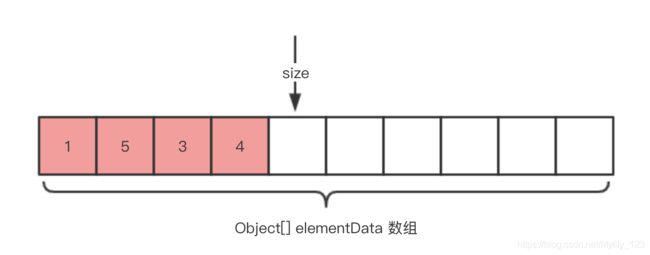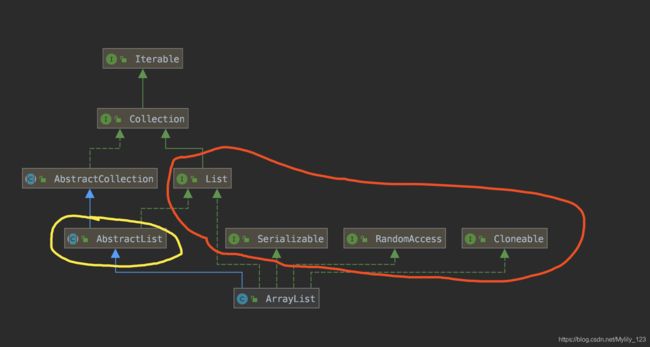集合——数组ArrayList
概述
基于数组实现,支持自定扩容的动态数组。
类图
- java.util.List 接口,提供数组的添加、删除、修改、迭代遍历等操作。
- java.util.RandomAccess 接口,表示 ArrayList 支持快速的随机访问。
import java.util.*;
public class RandomAccessTest {
public static void traverse(List list){
if (list instanceof RandomAccess){
System.out.println("实现了RandomAccess接口,不使用迭代器");
for (int i = 0;i < list.size();i++){
System.out.println(list.get(i));
}
}else{
System.out.println("没实现RandomAccess接口,使用迭代器");
Iterator it = list.iterator();
while(it.hasNext()){
System.out.println(it.next());
}
}
}
public static void main(String[] args) {
List<String> arrayList = new ArrayList<>();
arrayList.add("a");
arrayList.add("b");
traverse(arrayList);
List<String> linkedList = new LinkedList<>();
linkedList.add("c");
linkedList.add("d");
traverse(linkedList);
}
}
随机访问列表使用循环遍历,顺序访问列表使用迭代器遍历。
通过性能测试得出结论:ArrayList使用for循环遍历优于迭代器遍历;LinkedList是用迭代器遍历优于循环遍历。利用RandomAccess在遍历前进行判断,根据list的不同子类先泽不同的遍历方式,提升性能。
- java.io.Serializable 接口,表示 ArrayList 支持序列化的功能。
- java.lang.Cloneable 接口,表示 ArrayList 支持克隆。
继承java.util.AbstractList 抽象类,而 AbstractList 提供了 List 接口的骨架实现,大幅度的减少了实现迭代遍历相关操作的代码。可能这样表述有点抽象,胖友点到 java.util.AbstractList 抽象类中看看,例如说 #iterator()、#indexOf(Object o) 等方法。
属性
/**
* The array buffer into which the elements of the ArrayList are stored.
* The capacity of the ArrayList is the length of this array buffer. Any
* empty ArrayList with elementData == DEFAULTCAPACITY_EMPTY_ELEMENTDATA
* will be expanded to DEFAULT_CAPACITY when the first element is added.
*/
transient Object[] elementData; // non-private to simplify nested class access
/**
* The size of the ArrayList (the number of elements it contains).
*
* @serial
*/
private int size;

elementData:元素数组
size:数组大小。已使用的数组大小。
构造方法
private static final int DEFAULT_CAPACITY = 10;
private static final Object[] EMPTY_ELEMENTDATA = {};
private static final Object[] DEFAULTCAPACITY_EMPTY_ELEMENTDATA = {};
public ArrayList(int initialCapacity) {
if (initialCapacity > 0) {
this.elementData = new Object[initialCapacity];
} else if (initialCapacity == 0) {
this.elementData = EMPTY_ELEMENTDATA;
} else {
throw new IllegalArgumentException("Illegal Capacity: "+
initialCapacity);
}
}
public ArrayList() {
this.elementData = DEFAULTCAPACITY_EMPTY_ELEMENTDATA;
}
public ArrayList(Collection<? extends E> c) {
elementData = c.toArray();
if ((size = elementData.length) != 0) {
// c.toArray might (incorrectly) not return Object[] (see 6260652)
//如果集合元素不是 Object[] 类型,则会创建新的 Object[] 数组,并将 elementData 赋值到其中,最后赋值给 elementData 。
if (elementData.getClass() != Object[].class)
elementData = Arrays.copyOf(elementData, size, Object[].class);
} else {
// replace with empty array.
this.elementData = EMPTY_ELEMENTDATA;
}
}
-
无参构造函数一直有一个概念是会设置固定大小的数组,为什么初始化为DEFAULTCAPACITY_EMPTY_ELEMENTDATA空数组?
考虑到节省内存,首次添加元素时才真正初始化为容量10的数组。 -
为什么单独声明DEFAULTCAPACITY_EMPTY_ELEMENTDATA,而不是使用EMPTY_ELEMENTDATA?
DEFAULTCAPACITY_EMPTY_ELEMENTDATA 首次扩容为 10 ,而 EMPTY_ELEMENTDATA 按照 1.5 倍扩容从 0 开始而不是 10 。
添加单个元素
public boolean add(E e) {
ensureCapacityInternal(size + 1); // Increments modCount!!
elementData[size++] = e;
return true;
}
public void add(int index, E element) {
rangeCheckForAdd(index);
ensureCapacityInternal(size + 1); // Increments modCount!!
System.arraycopy(elementData, index, elementData, index + 1,
size - index);
elementData[index] = element;
size++;
}
private static int calculateCapacity(Object[] elementData, int minCapacity) {
if (elementData == DEFAULTCAPACITY_EMPTY_ELEMENTDATA) {
return Math.max(DEFAULT_CAPACITY, minCapacity);
}
return minCapacity;
}
private void ensureCapacityInternal(int minCapacity) {
ensureExplicitCapacity(calculateCapacity(elementData, minCapacity));
}
private void ensureExplicitCapacity(int minCapacity) {
modCount++;
// overflow-conscious code
if (minCapacity - elementData.length > 0)
grow(minCapacity);
}
private void grow(int minCapacity) {
// overflow-conscious code
int oldCapacity = elementData.length;
int newCapacity = oldCapacity + (oldCapacity >> 1);//1.5倍
if (newCapacity - minCapacity < 0) //oldCapacity==0时
newCapacity = minCapacity;
if (newCapacity - MAX_ARRAY_SIZE > 0)
newCapacity = hugeCapacity(minCapacity);
// minCapacity is usually close to size, so this is a win:
elementData = Arrays.copyOf(elementData, newCapacity);
}
数组扩容
grow 进行扩容
添加多个元素
public boolean addAll(Collection<? extends E> c) {
Object[] a = c.toArray();
int numNew = a.length;
ensureCapacityInternal(size + numNew); // Increments modCount
System.arraycopy(a, 0, elementData, size, numNew);
size += numNew;
return numNew != 0;
}
public boolean addAll(int index, Collection<? extends E> c) {
rangeCheckForAdd(index);
Object[] a = c.toArray();
int numNew = a.length;
ensureCapacityInternal(size + numNew); // Increments modCount
int numMoved = size - index;
if (numMoved > 0)
System.arraycopy(elementData, index, elementData, index + numNew,
numMoved);
System.arraycopy(a, 0, elementData, index, numNew);
size += numNew;
return numNew != 0;
}
移除单个元素
public E remove(int index) {
rangeCheck(index);
modCount++;
E oldValue = elementData(index);
int numMoved = size - index - 1;
if (numMoved > 0)
System.arraycopy(elementData, index+1, elementData, index,
numMoved);
elementData[--size] = null; // clear to let GC do its work
return oldValue;
}
public boolean remove(Object o) {
if (o == null) {
for (int index = 0; index < size; index++)
if (elementData[index] == null) {
fastRemove(index);
return true;
}
} else {
for (int index = 0; index < size; index++)
if (o.equals(elementData[index])) {
fastRemove(index);
return true;
}
}
return false;
}
private void fastRemove(int index) {
modCount++;
int numMoved = size - index - 1;
if (numMoved > 0)
System.arraycopy(elementData, index+1, elementData, index,
numMoved);
elementData[--size] = null; // clear to let GC do its work
}
移除多个元素
protected void removeRange(int fromIndex, int toIndex) {
modCount++;
int numMoved = size - toIndex;
System.arraycopy(elementData, toIndex, elementData, fromIndex,
numMoved);
// clear to let GC do its work
int newSize = size - (toIndex-fromIndex);
for (int i = newSize; i < size; i++) {
elementData[i] = null;
}
size = newSize;
}
public boolean removeAll(Collection<?> c) {
Objects.requireNonNull(c);
return batchRemove(c, false);
}
private boolean batchRemove(Collection<?> c, boolean complement) {
final Object[] elementData = this.elementData;
int r = 0, w = 0;
boolean modified = false;
try {
for (; r < size; r++)
if (c.contains(elementData[r]) == complement)
elementData[w++] = elementData[r];
} finally {
// Preserve behavioral compatibility with AbstractCollection,
// even if c.contains() throws.
if (r != size) {
System.arraycopy(elementData, r,
elementData, w,
size - r);
w += size - r;
}
if (w != size) {
// clear to let GC do its work
for (int i = w; i < size; i++)
elementData[i] = null;
modCount += size - w;
size = w;
modified = true;
}
}
return modified;
}
